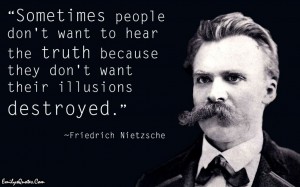哲學家尼采 Friedrich Nietzsche 曾經自嘲:
我的眼睛離我太近,所以我總是看不見自己。
Everyone says wisdom is great until
they have to face themselves and
put themselves under their own scrutiny.
( Jason Ling )
未曾開竅的人,一直都希望別人瞭解他;
開了竅的人,一般都會開始努力瞭解自己。
希臘哲學家 Socrates 認為「認識自己」know thyself
是人生中最重要的事情之一。
Aristotle 甚至認為「認識自己」是智慧的開端。
Knowing yourself is the beginning of all wisdom.
( Aristotle )
「認識自己」在心理學裡稱為「內省」,英語稱為
self-scrutiny, self-reflection, disciplined introspection.
「內省」一向都是中國儒家傳統的修養功夫。
曾子曰:「吾日三省吾身:為人謀,而不忠乎?
與朋友交,而不信乎?傳,不習乎?」 《論語。學而》
如果「內省」是完全的話,
如果「認識自己」的意圖相當強烈的話,
不可能沒有向內的「自我批判」self-criticism,
因為「自我批判」是「認識自己」的其中一個重要部份,
需要當事人誠實和客觀地面對自己。
換言之,就是需要一個「開放的腦」open-mindedness,
對真理的熱愛和「謙卑」intellectual humility。
愛真理,不能夠欠缺勇氣,
因為真理從來都不會理會閣下是否喜歡它!
愛智慧,就是追求真理的熱忱,
除了在思想上要不畏強權和暴力之外,
也絕對不會放過向內檢視,並且批判自己,
因為自己就是追求智慧的最重要工具!
The most terrifying thing is
to accept oneself completely.
( Carl Jung )
「自我批判」最初當然是一件令自己痛苦的事情,
所以智者環顧四周的朋友,都是放棄了追求智慧,
不願意「內省」和「自我批判」的人。
One does not become fully human painlessly.
( Rollo May )
愛智的人,以「真」和「誠」為「信仰」,
所以一定對人和對自己都誠實,
除了不「欺人」之外,亦不會「自欺」,
既沒有意圖欺騙別人,亦沒有意圖欺騙自己。
不「自欺」,所以絕對不會介意「自我批判」,
勇於步入全面「內省」的階段,
在沉默的內心世界裡自己考驗、批判、鍛鍊自己。
That is,
any person who claims that he loves wisdom
has to come face-to-face with who he really is
and what he wants himself to be.
如果一個人沒有足夠的勇氣向內「自我批判」,
如果「自我批判」成為他追求智慧路途上的銅牆鐵壁,
那表示他對智慧還未有足夠的熱愛。
「自我批判」這個階段是愛智的人最困惑的一段路程,
因為要經歷內心的煎熬與沮喪:
There is no coming to consciousness without pain.
People will do anything, no matter how absurd,
in order to avoid facing their own Soul. One does
not become enlightened by imagining figures of light,
but by making the darkness conscious.
( Carl Jung )
Until you make the unconscious conscious,
it will direct your life and you will call it fate.
( Carl Jung )
一般人也許會喜歡知道某些事情的真相,
但並不一定喜歡知道個人情緒和信念的來源,
不想知道個人情緒和信念是否可靠的行為指標,
更加不要喜歡中國儒家的內省和西方哲學的自我批判,
他們誤以為自我批判會令自己不開心,就是不愛自己。
We only see what we want to see;
we only hear what we want to hear.
Our belief system is just like a mirror
that only shows us what we believe.
( Don Miguel Ruiz )
We tend to be afraid of any knowledge that
could cause us to despise ourselves or to
make us feel inferior, weak, worthless, evil,
shameful. We protect ourselves and our
ideal image of ourselves by repression
and similar defenses, which are essentially
techniques by which we avoid becoming
conscious of unpleasant or dangerous truths.
( Abraham H. Maslow )
Few of us take the pains to study the origins
of our cherished convictions; indeed,
we have a natural repugnance to so doing.
We like to continue to believe what we have
been accustomed to accept as truth, and the
resentment aroused when doubt is cast on
any of our assumptions leads us to seek
every manner of excuse for clinging to them.
The result is that most of our so-called
reasoning consists in finding arguments
for going on believing as we already have.
( James Harvey Robinson )
Sometimes people don’t want to hear the truth
because they don’t want their illusions destroyed.
( Friedrich Nietzsche )
人生是一場戰鬥,
是善與惡、正與邪、智與愚、虛偽與真誠的鬥爭,
這場鬥爭和愛自己及愛值得愛的人一樣,是永不止息的;
這場鬥爭既向外,亦向內,因為外和內是一體的兩面,
外面固然有敵人,那些拒絕自我批判的人,內心亦會有敵人。
熱愛真理,追求智慧,擇善固執,去蕪存菁,融會貫通,
擁抱懷疑和批判的精神,可以說是既為己,亦為人,
需要屢世的努力,屢世的勇猛精進,積存屢世的智慧。
智慧越高的人,會嚴厲批判所有自己曾經接受過的信念,
並且不斷批判,努力建設個人的信仰在穩固的磐石之上,
努力保守自己的心,擇善固執,精益求精,
因為擇善固執的難處不在於擇,而在於固執,
而且不斷去蕪存菁,苟日新、日日新、又日新,
這樣才有能力分享智慧,才有能力愛更多的人,
才有能力做一位合資格的學生兼導師,教學相長,
心安理得地幫助更多追求智慧的同道中人,
這個道理是盲目歌頌大愛的人永遠不會明白的!
All the gods, all the heavens, all the hells,
are within you.
( Joseph Campbell )
The ‘kingdom of Heaven’ is a condition
of the heart──not something that comes
‘upon the earth’ or ‘after death’.
( Friedrich Nietzsche )
For to seek truth is always to run the risk
of discovering what one would hate to see.
It requires that kind of relationship to one’s self,
and that confidence in ultimate values,
that one can dare to risk the possibility of being
uprooted from the beliefs and day-to-day values
by which one has lived.
( Rollo May )
所謂「自律」self-discipline,不同的人會有不同的理解,
在善性循環、中性循環和惡性循環的人都會有不同的看法,
但智者明白只有「內省」和「自我批判」才是真正的自律!
簡而言之,「自我批判」和「內省」其實是愛自己的表現,
因為能夠「自我批判」和「內省」的人才可能有自知之明,
就是嘗試建設一個沒有內在矛盾的人格,
建設一個精神上的免疫系統,用來抵禦入侵的一切歪理,
才有能力獨立思考,並且「三思而後行」。
You make the world a better place
by making yourself a better person.
( Scott Sorrell )
The only journey is the one within.
( Rainer Maria Rilke )
總結一下:
愛智的人,以「誠」和「真」為「信仰」,
所以批判思維既向外,也向內。
真正愛智慧的人,自己一定是在批判範圍之內,
包括任何個人的信念、宗教和價值觀念。
這就是為甚麼愛智慧的人必須要有勇氣!
Life shrinks or expands according to one’s courage.
( Anais Nin )
有人說,我們每個人都背著一些包袱:
例如陋習、自私及妒忌等缺點、壞朋友。
這些包袱,大部份人遲早都會察覺。
只要拿起勇氣,嘗試把包袱放在前面,直接面對,及早處理,
就可以輕快地行走餘下的人生路途。
遺憾的是,錯誤的思想和半真半假的信念這兩大包袱,最難發現,
如果不願意立志追求真理,如果沒有人點醒,一生人都未必會察覺。
即使有人點醒,如果自己沒有足夠的智慧去領悟,
如果自己沒有足夠的勇氣去解決,就未必有能力把包袱放在前面,
直接面對,及早處理!
錯誤的思想和半真半假的信念,往往陪伴著一般人度過他們的一生。
What is to give light must endure burning.
( Viktor Frankl )
如果沒有追求智慧的勇氣,不願意自我批判,拒絕內省,
我們怎可能做世上的光?怎可能燃燒自己,照亮別人?
最後,我們必須明白自我批判和內省,
都是一種「主動的自我審查」,
和「被動被迫的自我審查」不可一概而論,
只不過有一些未曾接受過嚴謹思考訓練,
而又有語言潔癖的人和偽知識份子,
會非常抗拒「自我審查」這個詞彙。

